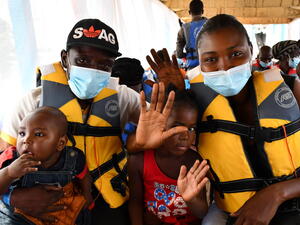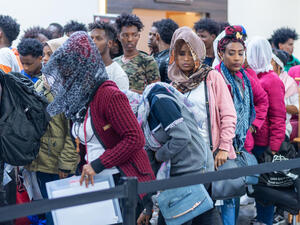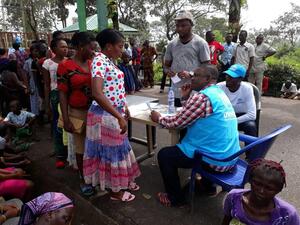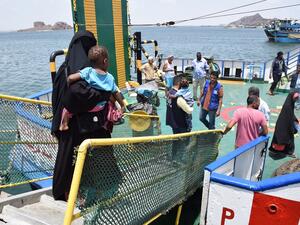Uganda: first group of Rwandan returnees set to leave
Uganda: first group of Rwandan returnees set to leave
A first group of Rwandan returnees is set to leave Uganda on Monday (19 Jan.) in a return operation organised by UNHCR and the governments of Uganda and Rwanda to assist the voluntary repatriation of some 23,000 Rwandan refugees living in settlements in the Mbarara district of south-western Uganda. This voluntary movement is part of a much wider effort in several African nations to help the region's remaining Rwandan refugees go home and rebuild their lives. In mid-2003, there were an estimated 60,000 Rwandan refugees scattered throughout several African countries. The start of the return operation from Uganda is the outcome of a tripartite agreement signed between the governments of Uganda and Rwanda and UNHCR in July 2003.
Monday's five-truck convoy is expected to repatriate a first group of 200 refugees from Nakivale - one of three settlements hosting Rwandan refugees in Uganda. The other two settlements are Kyakka and Oruchinga. The returnees are part of a group of 1,165 Rwandan refugees who have registered with UNHCR for repatriation assistance to various parts of Rwanda.
Returnee convoys are expected to travel from the settlements to Mbarara and on to the Gatuna crossing, some 300 km away. Gatuna is on the border between Uganda and Rwanda. Returnees will be transported to a transit facility which has been established close to the north-eastern town of Byumba. Here, they will receive a reintegration package consisting of basic kitchen utensils, plastic sheeting for shelter, blankets, jerry cans and soap. Some of the returnees will be transported by UNHCR trucks from the transit centre to their home areas or to the nearest location. Other returnees will receive transport assistance via commercial vehicles.
A profile of the Rwandan refugee population in Uganda shows that the refugees are from all areas of Rwanda. The largest number are, however, from the eastern areas of Kibungo and Utarama, which borders the Akagera National Park in the north-east of the country. Other refugees are from Gisenyi and Ruhengeri (north-west), Gitarama, (central) Kibuye, (west), Gikongoro and Butare (south).
The start of the return operation from Uganda and Rwanda next Monday follows a one-day tripartite meeting held between the governments of Uganda and Rwanda, and UNHCR on Jan. 7 to finalise plans for the operation. It is expected to be one of the last major return movements of Rwandan refugees remaining outside their country. The meeting held in the Ugandan capital, Kampala, was followed by a visit of Rwandan and Ugandan officials to the refugee settlements in Mbarara district on 8 Jan. The visiting Rwandan officials assured the refugees that upon their return home, they will either get back their own land or will be allocated plots that can support their families.
Elsewhere in Africa, UNHCR and host governments are making efforts to encourage Rwandan refugees to return home. In Zambia, a meeting held in the capital, Lusaka, on 9 Jan. between Zambian authorities and UNHCR resolved to send a team consisting of Rwandan refugee leaders, senior Zambian government officials, parliamentarians and UNHCR staff on a go-and-see-visit to Rwanda in early March 2004. The planned go-and-see visit is part of an information campaign aimed at encouraging the return of some 5,700 Rwandan refugees still in Zambia. An information campaign has also been launched in Tongogara camp in Zimbabwe where there are more than 3,500 Rwandan refugees.
In 2003, UNHCR and the government of Rwanda signed seven agreements for the return of Rwandan refugees currently in various countries in Africa, including Zambia (Jan.), Republic of Congo (June), Uganda (July), Malawi (Nov.), Namibia (Nov.), Mozambique (Dec.) and Zimbabwe (Dec.). The agreements signed in 2003 are in addition to others established earlier with the Central African Republic, Tanzania and Burundi.
In 2003, a total of 19,712 Rwandan refugees returned home from various countries, the majority of them with UNHCR assistance. Of this number, some 14,981 Rwandan refugees were assisted by UNHCR to return home from the Democratic Republic of the Congo - 8,214 returned home through Goma in eastern Kivu while 6,767 were assisted to return through Bukavu, on the southern shores of Lake Kivu. Other refugees returned from Tanzania, Burundi, Zambia, Uganda and Republic of Congo.








